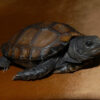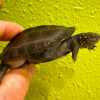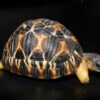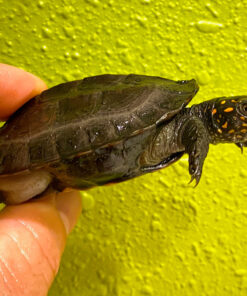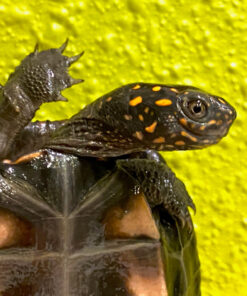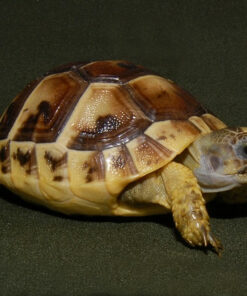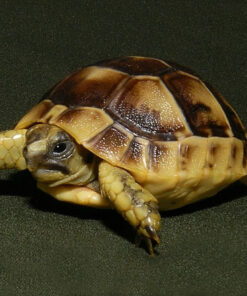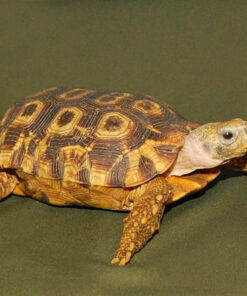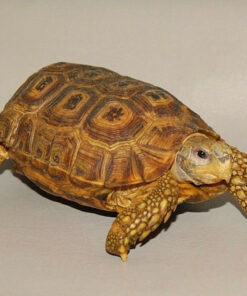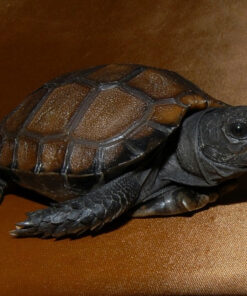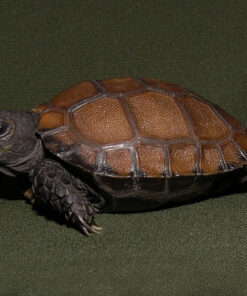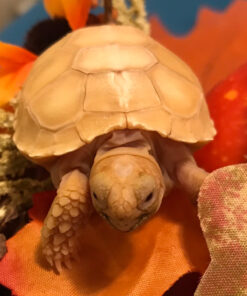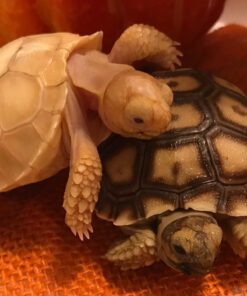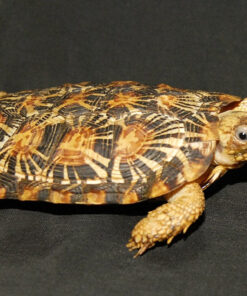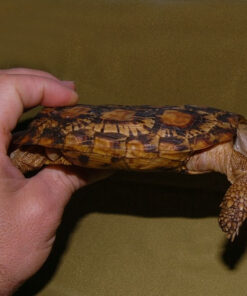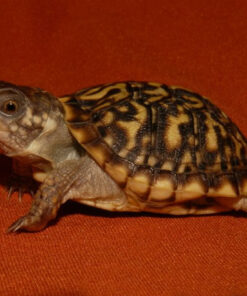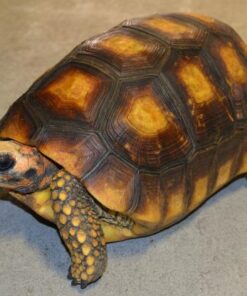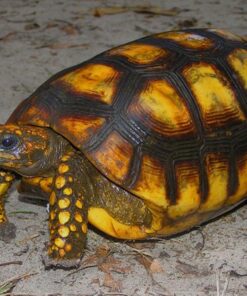$199.99
Discover captive-bred Baby Yellowfoot Tortoises, perfect for first-time reptile owners. These adorable pets have yellow markings and grow slightly larger.
Category: TORTOISE for sale
Baby Yellowfoot Tortoise for Sale: Your Guide to Owning and Caring for a Yellowfoot Turtle
If you’re looking for a friendly, long-lived, and beautiful pet, a baby yellowfoot (or yellowfoot turtle) might be the perfect addition to your family. These tortoises are beloved by reptile enthusiasts for their unique appearance, manageable size, and calm demeanor. They are also a great fit for both beginner and experienced tortoise keepers.
At **newyorkreptiles.com**, we are proud to offer healthy, ethically bred baby yellowfoot for sale, ensuring that your new pet will arrive ready to thrive in its new home. In this guide, we’ll walk you through everything you need to know about baby yellowfoot tortoises, from their natural habitat to how to properly care for them in captivity.
What is a Yellowfoot Tortoise?
The **yellowfoot tortoise** (Chelonoidis denticulata), also known as the yellowfoot , is a species of tortoise native to the tropical rainforests of South America. They are commonly found in countries such as Brazil, Venezuela, and Colombia. Their name comes from the yellow or orange scales on their legs and heads, which provide a stunning contrast to their dark brown or black shells.
Baby yellowfoot tortoises are particularly charming, with bright colors and manageable sizes, making them a great pet for those looking for a reptile that’s easy to care for and has a gentle temperament. These tortoises can grow quite large over time, but they remain relatively slow-growing compared to some other species.
Key Features of the Yellowfoot Tortoise:
– **Size at Hatchling Stage**: Baby yellowfoot tortoises are typically about 2-3 inches in length when they hatch.
– **Adult Size**: Adults can grow to about 14-16 inches in length, with some reaching up to 18 inches.
– **Lifespan**: With proper care, yellowfoot tortoises can live 50 to 70 years or more, making them a long-term commitment.
– **Coloration**: Bright yellow or orange scales on their legs, head, and face give the yellowfoot tortoise its name. Babies tend to have more pronounced colors that soften slightly as they age.
Why Choose a Baby Yellowfoot Tortoise?
When looking for a baby **yellowfoot for sale**, it’s essential to consider why this species might be the best fit for your household. Here are some reasons why a baby yellowfoot makes a great pet:
1. **Manageable Size at Birth**: While adult yellowfoot tortoises are large, babies start small and grow slowly. This allows owners to prepare for their long-term needs gradually.
2. **Gentle Temperament**: Yellowfoot tortoises are known for their docile nature, making them great pets for families or individuals looking for a calm, non-aggressive reptile.
3. **Unique Appearance**: Their beautiful yellow markings make them one of the most striking tortoise species. Baby yellowfoot tortoises have particularly vibrant colors, which add to their charm.
4. **Low Maintenance**: Once you’ve set up their enclosure and provided them with the right diet, yellowfoot tortoises require relatively low day-to-day maintenance compared to more active pets.
5. **Long Lifespan**: Owning a yellowfoot tortoise is a long-term commitment, but for those looking for a lifelong companion, they can provide decades of enjoyment and fulfillment.
– **Ethically Sourced**: Our baby yellowfoot turtles are bred in captivity by experienced breeders who prioritize the animals’ well-being. We never sell wild-caught tortoises, as we believe in supporting conservation efforts.
– **Health Guarantee**: We provide a health guarantee for all our tortoises, so you can be confident that your new baby yellowfoot tortoise is in excellent condition when it arrives.
– **Expert Support**: We offer expert guidance on how to care for your yellowfoot . From setting up the perfect enclosure to dietary recommendations, we’re here to help you every step of the way.
– **Safe Shipping**: We understand that shipping a baby tortoise requires special care. We use temperature-controlled packaging to ensure that your tortoise arrives safely, no matter where you are located.
How to Care for a Baby Yellowfoot Tortoise
Caring for a baby **yellowfoot tortoise** requires careful attention to its habitat, diet, and general well-being. These tortoises are resilient but require specific conditions to thrive, especially in their early stages of life.
#### 1. **Setting Up the Habitat**
One of the most important aspects of caring for a yellowfoot is providing the right enclosure. Baby yellowfoot need a safe, warm, and humid environment to grow healthily.
– **Enclosure Size**: A baby yellowfoot doesn’t need a huge enclosure, but it’s important to provide space for them to move around and explore. A terrarium or enclosure that is at least 3 feet by 2 feet is a good start for a baby. As they grow, you’ll need to increase the size of their enclosure.
– **Substrate**: Yellowfoot thrive on substrates that retain moisture, such as coconut coir, cypress mulch, or a soil and sand mix. The substrate should be deep enough for burrowing, which is a natural behavior for yellowfoot.
– **Temperature and Humidity**: Yellowfoot come from humid environments, so it’s essential to maintain a humidity level between 70% and 80%. The temperature in their enclosure should have a gradient, with cooler areas around 75°F and basking spots between 85°F and 90°F. Use a UVB lamp to provide light for 10-12 hours a day, as this helps with calcium absorption and bone health.
– **Hides and Water**: Provide hides or shelters where the baby tortoise can retreat for privacy and security. Always ensure there’s a shallow dish of clean water for drinking and soaking.
#### 2. **Diet for a Baby Yellowfoot Tortoise**
Baby yellowfoot are primarily herbivores, although they may occasionally consume small amounts of animal matter in the wild. In captivity, their diet should consist mainly of leafy greens, vegetables, and fruits, with the occasional protein source.
– **Staple Foods**: Feed your baby yellowfoot a variety of leafy greens, such as collard greens, dandelion greens, and mustard greens. You can also include vegetables like squash, zucchini, and carrots in their diet.
– **Fruits**: Baby yellowfoot enjoy fruits, but they should only make up about 10-15% of their diet. Safe fruits include papayas, mangoes, and berries. Avoid overfeeding fruits, as too much sugar can cause digestive issues.
– **Calcium and Supplements**: To support healthy shell and bone growth, provide a calcium supplement. You can dust their food with calcium powder a few times a week. Make sure to also provide a cuttlebone in their enclosure, which they can nibble on for extra calcium.
#### 3. **Behavior and Socialization**
Baby yellowfoot are naturally shy and may take time to adjust to their new environment. They enjoy exploring their enclosure, burrowing, and soaking in water. While they aren’t as interactive as other pets, with time and patience, they can become more comfortable and may even begin to recognize their owners.
– **Handling**: It’s best to limit handling in the early days after bringing your baby yellowfoot home. Allow it time to settle into its new surroundings. When handling is necessary, do so gently, always supporting the body and avoiding sudden movements.
– **Enrichment**: Enclosure enrichment is key to keeping your tortoise mentally and physically stimulated. Provide logs, rocks, and plants for them to explore and interact with. These items also help mimic their natural environment and promote healthy behaviors like digging and foraging.
#### 4. **Health Care and Veterinary Visits**
A baby yellowfoot is generally hardy if cared for properly, but like any pet, it can be susceptible to health issues. Regular checkups with a reptile-savvy veterinarian are important to ensure your tortoise remains healthy.
– **Common Health Issues**: Keep an eye out for respiratory infections, which can occur if the enclosure is too cold or not humid enough. Shell rot is another condition to watch for, especially if the enclosure is too damp or dirty.
– **Regular Monitoring**: Regularly inspect your baby tortoise for signs of illness, such as lethargy, loss of appetite, or changes in stool. If you notice anything unusual, it’s important to consult a veterinarian who specializes in reptiles.
Why Choose a Baby Yellowfoot Tortoise?
Choosing a baby yellowfoot as your next pet means embarking on a long and rewarding journey. These tortoises are relatively low-maintenance but require specific care to ensure they live long, happy lives. we’re here to help you make the right choice by providing healthy, well-cared-for baby yellowfoot
ises for sale. Our commitment to animal welfare and customer satisfaction sets us apart from other reptile suppliers.
FAQs About Baby Yellowfoot Tortoises
**Q: How big will my baby yellowfoot get?**
A: Baby yellowfoot will grow slowly over the years, eventually reaching 14-16 inches in length as adults, with some individuals growing even larger.
**Q: How long will my yellowfoot live?**
A: With proper care, yellowfoot can live 50 to 70 years or more, making them a lifelong companion.
**Q: Is it legal to own a yellowfoot ?**
A: Yes, it is legal to own a yellowfoot in most areas, but always check local laws and regulations before purchasing one.
**Q: What should I feed my baby yellowfoot ?**
A: Baby yellowfoot should be fed a variety of leafy greens, vegetables, and some fruits. A calcium supplement should also be provided.
Conclusion
Owning a baby yellowfoot tortoise is a rewarding experience for any reptile lover. These gentle creatures are easy to care for, and their unique beauty makes them a stunning addition to any home. At **newyorkreptiles.com**, we’re proud to offer high-quality baby yellowfoot turtles for sale. With our support and care, your tortoise will thrive in its new home. Whether you’re a first-time tortoise owner or an experienced keeper, we’re here to ensure your new pet has the best possible start in life.
Related products
Sale!
TORTOISE for sale
TORTOISE for sale
$174.99
TORTOISE for sale
$299.99
TORTOISE for sale
$249.00
TORTOISE for sale
Pancake Tortoise for Sale – Exotic Pets with Unique Flat Shells
$799.99
TORTOISE for sale
$399.99
TORTOISE for sale
Yellowfoot Tortoise for Sale – Find Exotic Pets for Sale | 8-13 Inches
$299.99

